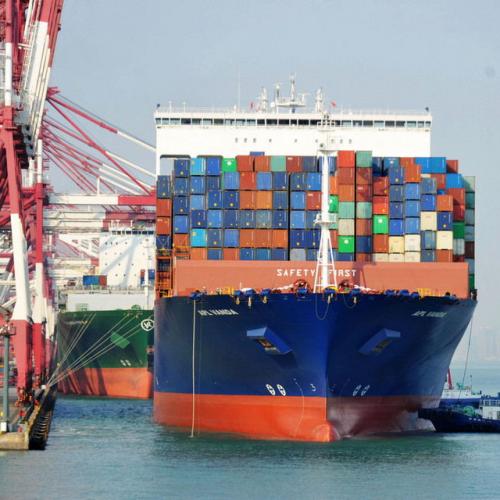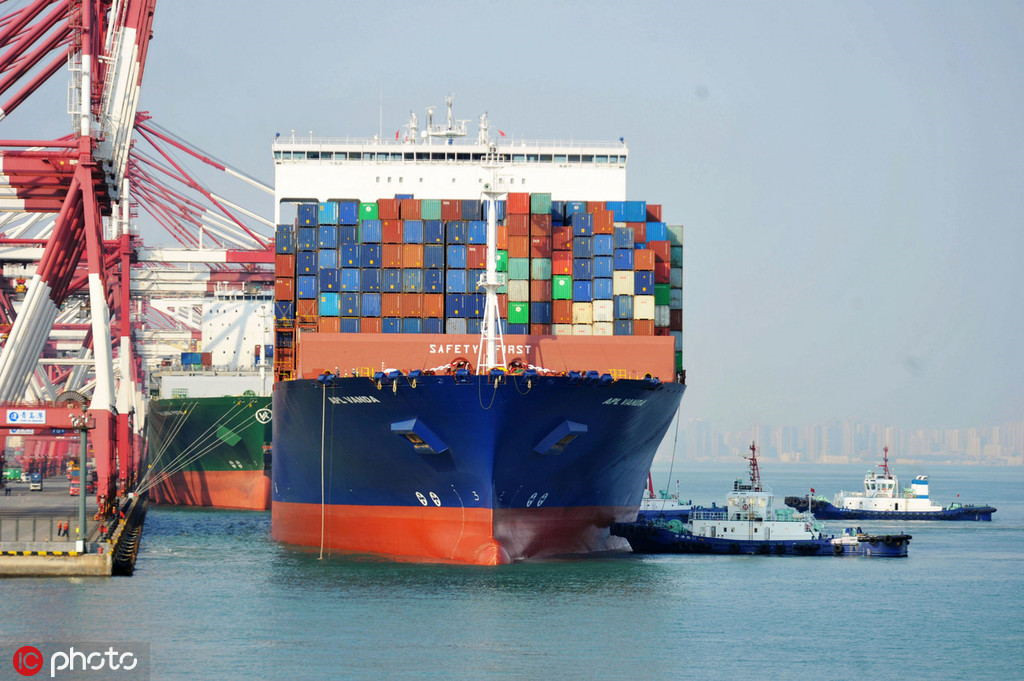



Major US trade bodies have urged the Trump administration to avoid further escalating tensions by suddenly increasing tariffs on Friday, while researchers said it's sensible for China to maintain a measured approach of continuing negotiations.
"This is a predicament for soy growers," American Soybean Association (ASA) President Davie Stephens said on Tuesday, a day after US Trade Representative Robert Lighthizer said he planned to move forward with President Donald Trump's Twitter threat on Sunday to increase the tariff rate from 10 to 25 percent on $200 billion worth of Chinese goods.
Stephens, a grower from Clinton, Kentucky, said that US farmers are in a desperate situation, and with depressed prices and unsold stocks forecast to double before the 2019 harvest begins in September, farmers urgently need the China market.
"We need a positive resolution of this ongoing tariff dispute, not further escalation of tensions," he said in a release posted on the ASA website.
Nicole M. Kaeding, vice-president of federal and special projects at the Tax Foundation based in Washington, said that if the Trump administration follows through on the president's threat, it's Americans taxpayers, not Chinese taxpayers, who will pay the price — through higher prices and fewer job opportunities.
"Raising tariffs is not good for economic growth and will reduce employment in the United States," Kaeding told China Daily.
The Information Technology Industry Council (ITI), the global voice of the tech sector, also warned against an increase in tariffs.
"Increasing tariffs would only continue to harm American consumers and businesses of all sizes and across all sectors, as well as threaten American economic growth and leadership in innovation," said Naomi Wilson, ITI's senior director of policy, Asia.
Threats to increase tariffs at this juncture in the negotiations could negatively affect the headway both sides have made, Wilson cautioned in a statement.
The US chemicals manufacturers also called for sensible trade-policy solutions.
Cal Dooley, president and CEO of the American Chemistry Council (ACC), said he believed the risks of continuing to use tariffs as a negotiating tactic with China are simply too high, and any potential benefits remain unclear.
China supplies the US with several chemicals that are not available anywhere else and which are critical inputs to US manufacturing. China is also the third-largest export market for US chemicals manufacturers, he said.
"We are starting to see signs that the tariffs are disrupting supply chains, cutting off markets and eroding US chemical-manufacturing competitiveness," Dooley said on Monday.
"ACC and its members strongly urge President Trump to remain focused on sensible solutions with China this week and forgo the imposition of higher tariffs," he said.
Several organizations, including Tariffs Hurt the Heartland, which is the national campaign composed of more than 150 of America's largest trade organizations in retail, technology, manufacturing and agriculture, have in recent days highlighted the negative impact of tariff increases on the US economy and job market.
They cited a February report from Trade Partnership Worldwide LLC as saying that increasing tariffs on $200 billion of goods to 25 percent, coupled with tariffs already in place, and retaliation, would reduce US employment by more than 934,000 jobs, cost the average family of four $767 and reduce US GDP by 0.37 percent.
On Tuesday, Beijing expressed sincerity toward continuing economic and trade talks with Washington, saying the Chinese side does not evade conflict, according to the Chinese Foreign Ministry.
Invited by Lighthizer and US Treasury Secretary Steven Mnuchin, Chinese Vice-Premier Liu He, who is also chief of the Chinese side of the China-US comprehensive economic dialogue, will visit the US on Thursday and Friday to attend the 11th round of the bilateral consultation on trade issues.
"Beijing went almost completely quiet in the day following the president's tweets, which seems to indicate that China has acclimated to Trumpian language," Scott Kennedy, senior adviser and director of the Project on Chinese Business and Political Economy in the Freeman Chair in China Studies at the Center for Strategic and International Studies, said on Tuesday.
The fact that Beijing is still sending a delegation to the US for the trade talks and urging the two sides to meet each other halfway for a trade deal is "very wise on China's part", said Gary Hufbauer, a senior fellow and trade expert at the Peterson Institute for International Economics in Washington.
"There is no payoff to China or the US from escalating trade tensions," Hufbauer told China Daily. "In the end, Trump wants a deal because the alternative of a trade war will damage his 2020 reelection prospects."
Douglas H. Paal, vice-president of the Asia Program at the Carnegie Endowment for International Peace, also commended China's approach.
"It makes sense to continue the talks because the alternative would be a drastic signal to markets," Paal said.
"But if the delegation is not high level, then the outlook is seriously deteriorating for an agreement," he said on Monday, a day before Beijing confirmed that Liu would lead the Chinese delegation for a new round of talks in Washington.
If you have any problems with this article, please contact us at app@chinadaily.com.cn and we'll immediately get back to you.